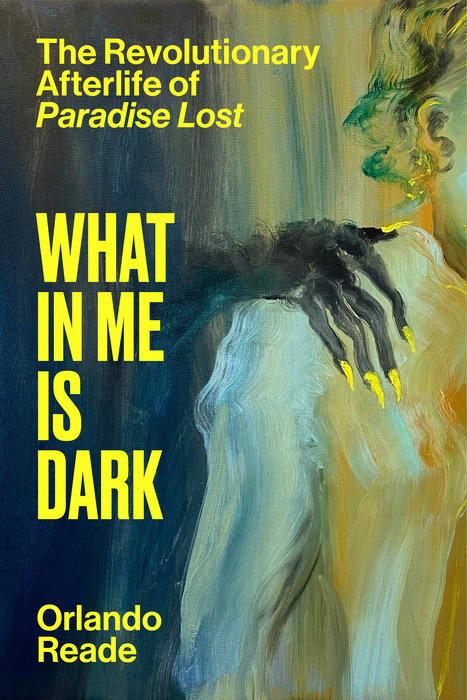
A highly original hybrid of literary criticism and political history, telling of the enduring, surprising and ever-evolving relevance of Milton’s epic poem through the scandalous life of its creator and the revolutionary lives that were influenced by it.
What in Me Is Dark tells the unlikely story of how Milton’s epic poem came to haunt political struggles over the past four centuries, including the many different, unexpected, often contradictory ways in which it has been read, interpreted, and appropriated through time and across the world, and to revolutionary ends. The book focuses on twelve readers—including Malcolm X, Thomas Jefferson, George Eliot, Hannah Arendt, and C.L.R James—whose lives demonstrate extraordinary and disturbing influence on the modern age.
Drawing from his own experiences teaching Paradise Lost in New Jersey prisons, English scholar Orlando Reade deftly investigates how the poem was read by people embedded in struggles against tyranny, slavery, colonialism, gender inequality, and capitalist exploitation. It is experimental nonfiction at its finest; rich literary analysis and social, cultural and political history are woven together to make a clarifying case for the undeniable impact of the poem.
Book Details
"Enlightening and enthusiastic."
—Ed Simon, The New York Times Book Review
"It's unusual, and instructive, to encounter a work of criticism so at ease with the idea that its cherished object might, at best, be useful to its readers—answerable to their needs and their purposes."
—Catherine Nicholson, New York Review of Books
"The most perceptive passages in Mr. Reade’s book place thinkers in lively debate over the central meanings of Milton’s work . . . What in Me Is Dark attentively summarizes all these perspectives."
—Benjamin Shull, The Wall Street Journal
"What In Me Is Dark is, among other things, about the fraught relationship between art and revolution. It demonstrates for us how a poet wrestles with his own nature, and how societies and cultures do so too. It meditates on its own having-fallen, as both Adam and Satan do in Milton’s poem, and as we would do well to do right now, given the particular insanity of our current predicament. Orlando is a brilliant and a precise thinker."
—Ariana Reines, BOMB
"An incredible, pulsing reappraisal of how Milton’s great work has driven and influenced thinkers and revolutionaries from Thomas Jefferson to Malcolm X and beyond. Original and timely."
—The Big Issue
"[An] excellent debut study . . . This edifying analysis testifies to the enduring power of literature."
—Publishers Weekly, starred review
"Reade makes an eloquent case for the continuing vitality of Paradise Lost . . . Concise and lively."
—Andrea Brady, Times Literary Supplement
"[What in Me Is Dark is a] thoughtful, wide-ranging and astute book . . . As a response to such a complex and equivocal historical figure neither hagiography nor iconoclasm seems quite adequate, and Reade’s excellent book strikes a difficult and deft balance between the two."
—Joe Moshenska, The Guardian
"[What in Me Is Dark] has something for the English Renaissance freaks (me) and merely Milton-curious alike . . . The resulting work is a multivalent argument for the past’s reverberating potential to speak to our present moment."
—Kate Bailey, Sewanee Review
"With this book, school’s in session in the best way."
—Sharon Hsu, Goodreads
"A fresh consideration of the long and surprising afterlife of John Milton’s epic Paradise Lost . . . Edifying, wide-ranging cultural criticism."
—Kirkus Reviews
“This is a rare and extraordinary book. In tracing the surprising revolutionary legacy of Milton’s epic, Reade has himself produced a liberatory text. This is not only a book for Milton scholars, but anyone invested in the poetics of freedom struggle.”
—Natasha Lennard, author of Being Numerous: Essays on Non-Fascist Life
“Wonderfully written, intelligent and moving. Orlando Reade follows the enduring conversation between Milton’s Paradise Lost and revolutionaries across the centuries. Reade reminds us that literature is action, that epic poetry has the power to liberate minds, pens, and voices. Behind every revolution is a song. As it turns out, so often that song has been Paradise Lost.”
—Leah Redmond Chang, author of Young Queens: Three Renaissance Women and the Price of Power
“Orlando Reade writes with exhilarating style, luminous clarity, and irreverent wit. Each page of What in Me Is Dark is aflame with ideas—on the relation between politics and evil, abolition and poetry—and with the sublimity of Milton’s verse, deftly brought alive. Earth may be hell, but fallen angels, as Reade shows, have been our unexpected guides toward freedom and justice.”
—Anna Della Subin, author of Accidental Gods: On Men Unwittingly Turned Divine
“With many new discoveries and insights, Orlando Reade tells the story of how Milton’s Paradise Lost has inspired crucial figures in literature and politics. Reade writes a new history of liberty, as he shows how Milton has provided an influential and enduring resource for a better world, one for which we still strive.”
—Nigel Smith, Princeton University, author of Is Milton Better than Shakespeare?
"An entertaining, wide-ranging, and generally well-researched account of the meaning and influence of John Milton’s great epic, Paradise Lost." —James Matthew Wilson, World

